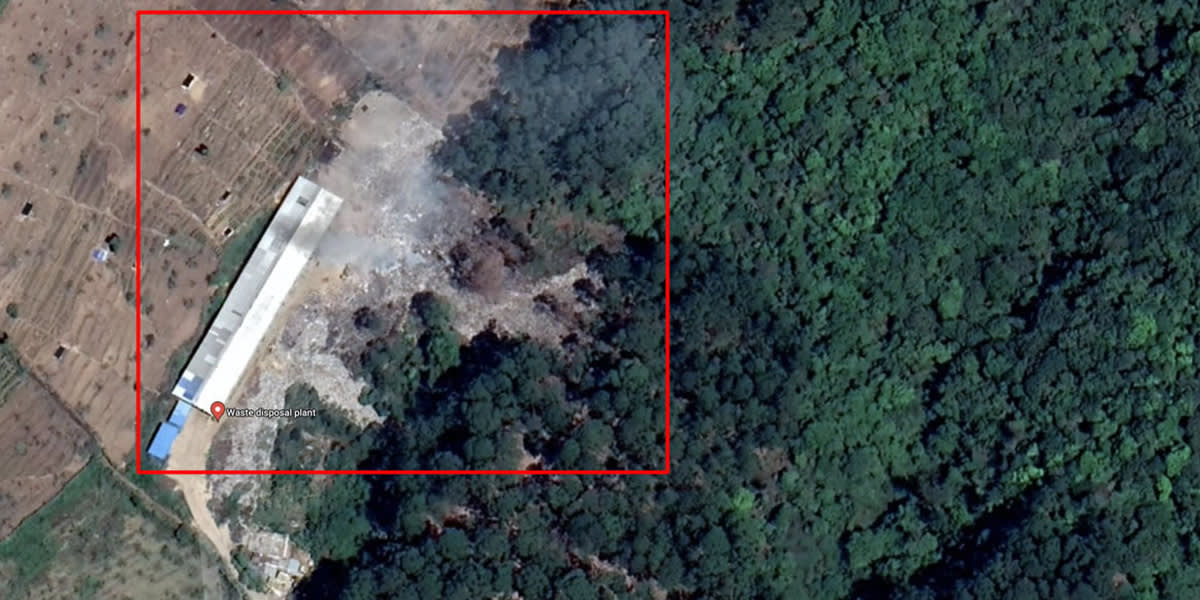Avijit Michael, who runs the activism-oriented NGO Jhatkaa.org, lives within a kilometre of Prakasapuram, with the forest on one side and a pear orchard on the other. For the most part, it is paradise, with deer, bison, and wild boar walking freely through his land. He built his cob house, Shaala, using clay and a mixture of sand and straw, in 2013, with help from a handful of art students from Bangalore and local workers from Prakasapuram. It is quiet, serene, and beautiful―until the wind turns.
This is when the full force of Kodaikanal’s broken waste management system hits home. ‘Broken’ is both literal and figurative―a retaining wall that stands over five stories high is broken. The damaged wall was first noticed in March 2018. A mountain of unsegregated garbage now spills over from the dump above into the forest below. The pile of garbage is so large that it is visible from space (as seen in this photo from Google Maps).
The casualties of Kodaikanal’s broken waste management system are the inhabitants of the forest around Prakashapuram and the residents of Perumalmalai, who drink the water from the stream that is fed by rainwater run-off from the garbage dump. Citizens are coming together to tackle this sore on Kodaikanal’s side, which they hope will soon be addressed.
Avijit Michael told The Kodai Chronicle that he has written letters to the Municipality, the Forest Department in Kodaikanal and the Chief Conservator of Forests in Chennai. He has also filed an RTI. Based on these, he is optimistic about action being taken this year. He has received verbal commitments from a senior official regarding actions that will be taken in 2021. (The official was not available for comment at the time of publication.)
This citizen-government tango is not new and goes back well over two decades. In the early noughties, some senior Kodaikanal residents came together and took legal action as well. One of the early initiators on this same issue is M Thanabalagan, an advocate and long-term resident. He told The Kodai Chronicle, ‘In 2002, SHELTER Trust in Kodaikanal filed a writ before the Honourable High Court, Chennai, about [the] Kodaikanal garbage dump matter, as it was near the reserve forest. The Honourable High Court gave some directions to local authorities [regarding] how to proceed about the garbage dump matter to save the forest. It is the responsibility of local authorities to implement the said High Court order.’
KS Justin, Prakasapuram Village Councillor, is clearly frustrated, too. He told us that he has written five different letters to authorities at various levels in the hierarchy, which he claims went unanswered. He said, ‘None of us here have grown up with a big education or have big jobs. We have only this kind of farm work. Because they are putting it [the garbage] in our village, all our efforts are getting wasted, our crops are getting damaged, and even the animals in the forest are getting affected. Monkeys and birds are fewer because of this. We don’t have a voice to tell them. We are simple people who do simple farm work, and we feel like there is nothing we can do to stop them.’
In the meanwhile, active citizens, like Zarreen Babu, who has lived in Prakasapuram for 24 years, has been organizing the citizens of the village she calls home. She says the matter of Prakashapuram’s garbage dump is close to her heart—and her home. Together with other concerned citizens of Kodaikanal, Babu has spent days following garbage trucks on their routes, to understand where the system is broken. ‘I found that even if citizens do segregate, their efforts are often wasted, as the segregated waste ends up getting mixed in the truck or further down the delivery system,’ she says.
Dr. Rajamanikam Ramamoorthy, who has a doctorate in Solid Waste Management, works with Kodaikanal International School’s Social and Environment Experience Department SEED), and is currently working on a decentralized waste management program with 23 schools in the area. He argues that ‘The dump is equipped to handle the waste of the registered Kodaikanal population. It is not equipped to handle the floating population that visit the 4000+ hospitality businesses as tourists. The local municipality simply cannot handle such a load, and it is not fair to expect them to do so. We as citizens need to support the municipality.’
Dr Ramamoorthy, who has also worked in the forest department, believes that Kodaikanal’s broken waste management system can be fixed with a little planning. ‘There are many literate, motivated, and sensitized people living in Kodaikanal, so a lot is not needed to mobilize them. The government can use local expertise and make sure that they facilitate community-based waste management units.’ The only thing needed now, he observes, is coordination. ‘There are many good people, but they are all working alone. We just need them to come together.’
The Kodai Chronicle is planning a follow-up on garbage and waste management in Kodaikanal in our next issue.
We invite citizens of Kodaikanal to sign and share this new petition requesting authorities to take action.






